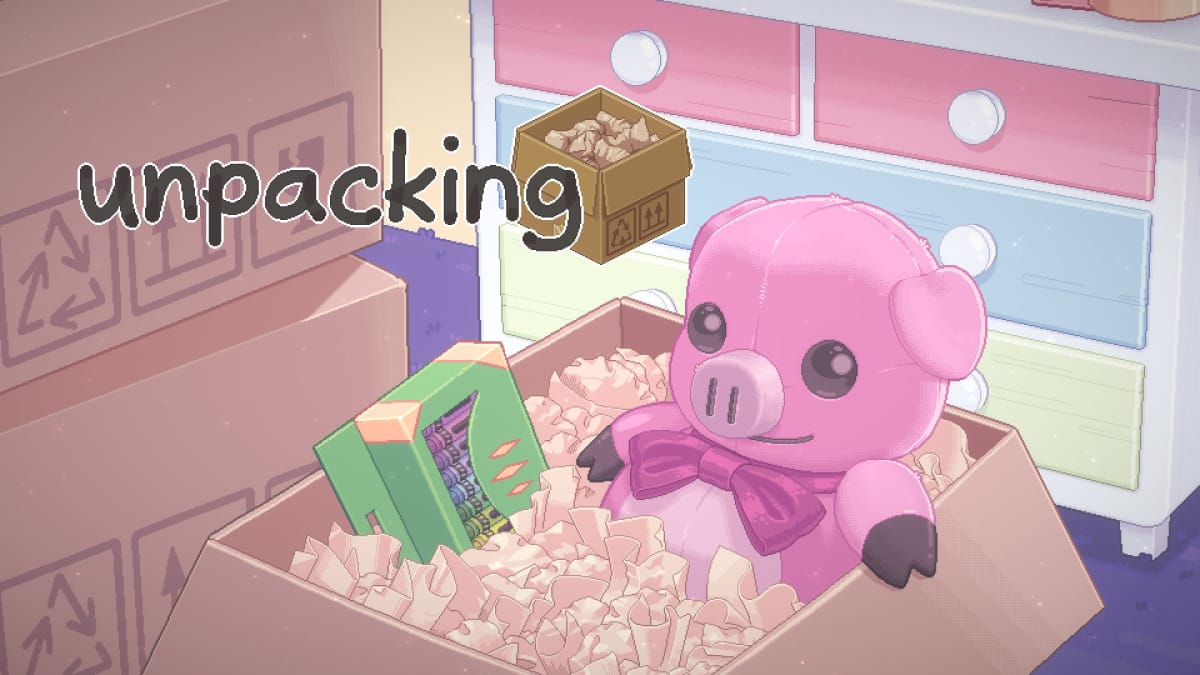You can tell a lot about a piece of art by how it makes you connect with its characters. Where some go for grand gestures and big moments, some deal with the intricacies of the everyday. The way someone presents themself is such an important factor in how you see them but that is ultimately all for show. The way they show themselves is how they exist when they're comfortable - without the watchful eyes of the rest of the world. Take a look around you right now - what do your surroundings say about you? How do all those micro factors that make up your environment really represent you? This is what Unpacking aims to represent and it does it surprisingly well.
To put it simply, Unpacking is a puzzle game where you must unpack someone's possessions into new rooms, apartments, and houses throughout their life. It tells the subtle tale of someone throughout a twenty-year period through a laid-back mixture of a house decorator and Tetris. You must open up boxes one by one and place the items in their intended place. You develop your own patterns, get accustomed to certain things and start to work out who this person is you're unpacking for.
.jpg?itok=TYVBgIaw)
You start off in a small room, trying to make room for a Rubik's Cube and a football trophy but just one level later, you're preparing for college with a new (for 2004 at least) PC. It has this great way of showing you all those little things we keep with us as we age. The small plushies or big memories - they all mean something in the tapestry of who you are. In this sense, Unpacking isn't just a pleasant cozy game where you pack, it's a celebration of human growth - our ability to find meaning in something as small as finding the right place for your new chicken toy.
Eventually, you have to start to fit your life around others. Moving from a child to a teenager and an adult sharing a house, you no longer have full free will over your surroundings. This allows you to piece together who exactly you're sharing a house with and why. You build out personalities, work out where they are and why, ultimately, you may have to move on. That inevitable draw of time means you never get the chance to actually meet them and, as soon as you're finished, the game moves ahead to the next crucial part of this person's life. There's a certain sadness in the realization that you will only ever see their stuff again as they leave to do something new. That being said, the puzzle of figuring out where they are now is just as interesting.
One time, you actually get to keep most of the things as you left them but now, you have to add more. Something about the methodical way I set up everything always left room for one more character - naturally showing how important other people are in your life. The role people add as they come along and the sizable hole left behind as they leave. It tells the story of a huge portion of someone's life exclusively through their possessions but what it leaves out is just as important. There's a real joy in trying to piece together a person from how they present their house and, as the person putting everything away, you get to play a role in it all.
.jpg?itok=xcKVkKJm)
Both the art and music have this charming simplicity to them. It pairs a semi-pixelated style with some fun chiptune to do a few major things: It doesn't want to distract and it wants to imbue itself with a sense of nostalgia, something it does very well. Growing older alongside this person, moving from an old Gameboy to modern consoles, lets you really see the technological progress in front of your eyes. After you've put everything away, the house highlights certain objects in red. This lets you know you've put them in a bad place. For the most part, you have some leniency over your choices but make any that are particularly bad or out of place and it will tell you to fix them before you can move on. Initially, I saw this challenge as unnecessarily restrictive but it helps to put some distance between you and the person whose life you are unpacking. You need to categorize life to their standard and it helps paint that picture even clearer.
That person is artistic, kind of nerdy, cutesy, and multifaceted. They enjoy tons of different hobbies, they listen to music, they play games, they like cooking. They picked up a liking of coffee from an ex alongside an appreciation for Asian food. They grow throughout the game to take on more stuff and, alongside this, become a fully-fledged human being.
The game isn't perfect. Some items can occasionally be hard to make out, the gameplay feels a little too simplistic by the end, and there's little replayability once you finish it. Although it may disrupt the story Unpacking is telling, it could perhaps benefit from bonus modes or even a creator of some kind where you can make your own apartment for others to unpack. It feels like there's little reason to come back after you complete the handful of central levels on offer. That being said, I felt oddly accomplished hitting the end credits.
.jpg?itok=iOxjzDNh)
Unpacking - Final Thoughts
Putting your stuff away generally tends to represent a transition in your life - that scary period in between something comfortable and something fresh and exciting. It gives you the chance to explore new avenues and explore a little more about yourself. Unpacking nails this experience by having you unpack someone else's world. For a night, you get to live out a person's life through the things they pack and it lets you connect with something almost ethereal in the process. Through its cutesy art direction, calming music and addictive gameplay loop, it manages to represent those times in our lives that we are moving too fast to appreciate and I, in turn, appreciated the chance to live such a mundane experience once more.
TechRaptor reviewed Unpacking on PC with a code provided by the publisher. The game is also available on Nintendo Switch and Xbox One.
Review Summary
Pros
- Lovely Atmosphere
- Enjoyable Subtle Storytelling
- Unique Gameplay
- Charming Visuals
Cons
- Little Replayability
Have a tip, or want to point out something we missed? Leave a Comment or e-mail us at tips@techraptor.net







